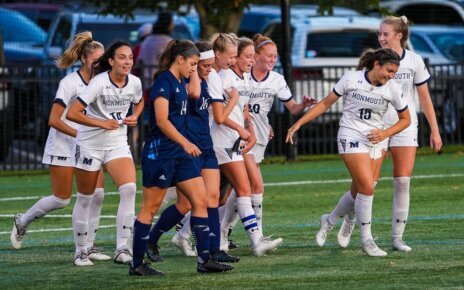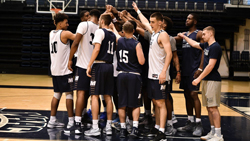The University hosted the sports editor of The Nation, Mr. David Zirin, during its 13th annual Global Understanding Convention last week.
Zirin’s lecture, “Talk Sports and Resistance in the United States,” was focused around the idea that sports and politics coincide. The event took place in a very crowded Wilson Hall auditorium and provided a chance for students, faculty and the community alike to hear Zirin’s thoughts on the subject.
Zirin first became interested in sports and politics in 1996 when a basketball player for the Nuggets, Mahmoud Abdul-Rauf, refused to be on the court during the nation’s national anthem, the Star Spangled Banner.
“After this moment, I started to learn about activist athletes. I would be in the basement of the library at school digging for this information,” said Zirin. He explained that in order to find out what the influence of politics was on sports, you had to do your research and look back at history.
Zirin brought up many different examples of how key players in sports had used their position to try and make a change. Jackie Robinson, Muhammad Ali, and John Carlos were among the names mentioned during the lecture.
“Jackie Robinson was the most requested speaker at events because he would always say ‘I would rather choose full citizenship than the Baseball Hall of Fame any day,'” said Zirin. Robinson was considered to be a leader in many anti-segregation movements in the 1930’s, added Zirin.
In 1960, Muhammad Ali won his first gold medal at the Olympics in Rome, Italy. “Ali’s dream was to bring the sportsmanship of wrestling to the sport of boxing,” said Zirin. Ali, who was very opposed to the Vietnam War, felt that he could use the war as a way to try and bring equality among men. He stated that soldiers should not have to fight a war abroad when Americans are fighting a war on their homeland.
Throughout his various examples, Zirin continued to prove to the crowd that politics do hold a place in sports, both professional and amateur.
“He showed just how great of an influence athletes can have on the American public if they choose to use the platform they are given. They are put in such a spot that their opinions on politics and social issues are very important and can potentially have an impact on a great amount of people,” a junior communication student, Joe Lacalandra said.
Mike Heyer, a senior communication major, said that he enjoyed how Zirin took major sports and showed how they were a platform for major issues in our society. “I learned that all sports stories and issues have another side to them when looking at it compared to our culture as a whole,” said Heyer.
Zirin made a point about how women in sports were always restricted. Medical personal would publish statements telling women that sports will give them permanent health complications. He mentioned that before the passing of Title 9, only one out of 39 women were able to participate in sports. Title 9 was a bill passed in 1972 by congress that stated no one could be excluded from an activity or sport because of their sex. Thanks to this bill, one out of every three girls growing up are now involved in some sort of sport.
Courtney Carr, a junior communication major, said she enjoyed coming and learned a lot about how political sports can actually be. “I only came because I had to for class, but I am glad that I did because I found it very informative.” Carr was one of several individuals who asked Zirin questions after his lecture.
In addition to what was mentioned about major league sports, Carr believes that Zirin could have talked more about sports on the college level. “I think it’s more relatable since he was on our college campus,” said Carr.
Laurel Weber, a junior communication major, agreed with Carr saying that she found the lecture to be informative. “I was thoroughly entertained because the speaker really knew his sports history, which was interesting to learn about.”
After an overall well reception from the audience, Zirin closed with a statement that was profound and summed up the entire presentation. “We need to leverage sports as a way to promote social justice.”



